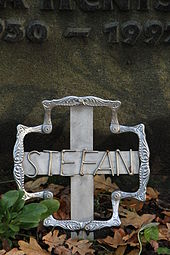Stefan Hentschel
Stefan Hentschel (born September 30, 1948 in Chemnitz-Gablenz , † December 18, 2006 in Hamburg ) was a pimp and boxer on St. Pauli .
Life
Hentschel lived with his grandparents until he was nine years old and then moved to Hamburg. On September 21, 1973 he played his first and only fight as a professional boxer in the Ernst-Merck-Halle . He was knocked out by Erwin Josefa ("Big Ali") in the second round. Then, after less than six minutes of fighting, Hentschel ended his "professional boxer career". The Hamburger Abendblatt reported on Hentschel's fight as follows: “The first chapter in the boxing program was a sad one for overzealous managers and for the female fans who admired the body builder Stefan Hentschel when he took off his bathrobe: Stefan Hentschel, the boxer out the retort, which had never fought a real fight before, which was presented to the amazed onlookers as co-king, experienced an embarrassment that no one allowed him to. (…) In the second round, beautiful Stefan's muscles were on the ground for the second time. With the 'out' against the second-class Josefa (Curacao) came the disillusionment. "
In the 1980s, Hentschel and his friend Waldemar Dammer, known as Neger-Waldi , were the red light godfather in the St. Pauli neighborhood . He was involved in the Kiez War and survived several assassinations; he lost his right eye in an attack with a wheat beer glass . Hentschel was present in the media, for example through his work on the NDR report Hamburg-St. Pauli - where the contrasts pop or the publication of Hamburg's night jargon. The language of the Kiez in St. Pauli by the linguist Klaus Siewert .
Hentschel gained international fame through his appearance in a scene from the documentary The Boxing Prince by Gerd Kroske about the life of boxer Norbert Grupe , who called himself "Prince of Homburg". While Hentschel strolls across the Grosse Freiheit , a side street of the Reeperbahn on St. Pauli, and tells the reporter about his beginnings in the red light district ( “Yes, at that time with four women in the day shift ...” ), the filming is unexpected disturbed by a young man who steps into the camera image without authorization and speaks to the camera team. Hentschel asks the young man to go on ( "Do you have a problem ?! Go on!" ), And then slaps him - because he does not respond to the request, just stares at him in amazement. Shortly afterwards, he recommends the slapped man to leave ( "Another problem? Better eat it!" ). Hentschel then asks the film team to go on with him ( “So, come on, go on!” ), Because he “didn't feel like talking to the assholes here”. A few moments later, Hentschel greets a “good friend” in a good mood ( “Hello Werner!” ). This scene achieved cult status on the internet.
On December 18, 2006, Hentschel hanged himself in the boxing cellar of the trendy bar " Zur Ritze " on the Reeperbahn on St. Pauli in Hamburg. The last few weeks before his suicide he was depressed and expressed his "thoughts of emigration" to friends. In addition, there was speculation in the press about massive money and drug problems as the reason for the suicide. Hentschel's urn was buried in the grave of his parents in Ohlsdorf cemetery .
literature
- Ariane Barth: In the red light. The explosive life of Stefan Hentschel . Ullstein, Berlin 2005, ISBN 3-548-36769-0
- Ariane Barth: The Reeperbahn. The fight for Hamburg's sinful mile . Hoffmann and Campe, 1999, ISBN 3-455-15028-4
- Julia Jüttner: The brothel king's last party . In: Der Spiegel , December 28, 2006
- Julia Jüttner: The crazy life of the godfather of St. Pauli . In: Der Spiegel , December 28, 2006
- Julia Jüttner: Milieu study The Kiez and Hentschels suicide . In: Der Spiegel , June 15, 2007
- Klaus Siewert / Stefan Hentschel: Hamburg's "night jargon": The language in the neighborhood in St. Pauli. With a CD "Night jargon in forgotten Hamburg songs". Münster, 2009. ISBN 978-3000127816 .
Movie
- Gerd Kroske: The boxing prince . Realist film, 2000
- dctp: Death of a pimp - the excessive life of a Hamburg neighborhood legend . VOX, 2007
- Spiegel TV: "I am a divine pimp" - the life and death of a neighborhood legend . VOX, 2008
Web links
- Literature by and about Stefan Hentschel in the catalog of the German National Library
- The Boxprinz in the Internet Movie Database (English)
- Stefan Hentschel in the BoxRec database
- Death of the neighborhood legend Stefan Hentschel ( Memento from May 12, 2012 in the Internet Archive ), sommer-in-hamburg.de, 2009
- Julia Jüttner: Milieu study: Der Kiez and Hentschel's suicide , Der Spiegel, 2007.
Individual evidence
- ↑ https://www.abendblatt.de/archive/1973/pdf/19730921.pdf/ASV_HAB_19730921_HA_022.pdf
- ↑ The "little one" stole the show from the "big one". In: Hamburger Abendblatt. September 22, 1973, Retrieved May 3, 2020 .
- ↑ Face slapping scene at dailymotion.com
- ↑ Article: Suicide: Kiez legend hangs himself in the "crack" . In: The world . December 19, 2006
| personal data | |
|---|---|
| SURNAME | Hentschel, Stefan |
| BRIEF DESCRIPTION | German brothelier |
| DATE OF BIRTH | September 30, 1948 |
| PLACE OF BIRTH | Gablenz , Soviet Occupation Zone |
| DATE OF DEATH | December 18, 2006 |
| Place of death | St. Pauli , Hamburg , Germany |
